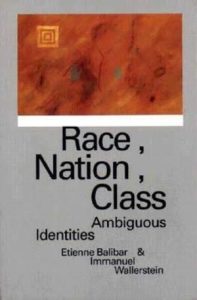Race, Nation, Classe. Les Identités Ambiguës

Author: Étienne Balibar & Immanuel Wallerstein
Publisher: Verso
Year of Publication: 1991
Print Length: 232 pages
Genre: Philosophy / Race Studies, Ethnic Studies, Sociology, Anthropology, History, Political Science, Social Science
Area: Africa
Topic: Race, Class, Ethnic & Ethnicity, National Consciousness, Nationalism, Racism, Chauvinism, Capitalism, Colonialism & Post-Colonialism, Universalism, Sexism; Modernity, Modernism, Modern; State Formation, Labor & Contract, Xenophobia, Identity, Crisis/Crises, Black People
Forty years after the defeat of Nazism, and twenty years after the great wave of decolonization, how is it that racism remains a growing phenomenon? What are the special characteristics of contemporary racism? How can it be related to class divisions and to the contradictions of the nation-state? And how far, in turn, does racism today compel us to rethink the relationship between class struggles and nationalism?
This book attempts to answer these fundamental questions through a remarkable dialogue between the French philosopher Étienne Balibar and the American historian and sociologist Immanuel Wallerstein. Each brings to the debate the fruits of over two decades of analytical work, greatly inspired, respectively, by Louis Althusser and Fernand Braudel.
Both authors challenge the commonly held notion of racism as a continuation of, or throwback to, the xenophobias of past societies and communities. They analyse it instead as a social relation indissolubly tied to present social structures–the nation-state, the division of labour, and the division between core and periphery–which are themselves constantly being reconstructed. Despite their productive disagreements, Balibar and Wallerstein both emphasize the modernity of racism and the need to understand its relation to contemporary capitalism and class struggle. Above all, their dialogue reveals the forms of present and future social conflict, in a world where the crisis of the nation-state is accompanied by an alarming rise of nationalism and chauvinism.
Table of Contents
Contents
Preface
Part I. Universal Racism
Is There a ‘Neo-Racism?’
The Ideological Tensions of Capitalism: Universalism versus Racism and Sexism
Racism and Nationalism
Part II The Historical Nation
The Construction of Peoplehood: Racism, Nationalism, Ethnicity
The Nation Form: History and Ideology
Household Structures and Labour-Force Formation in the Capitalist World-Economy
Part III Classes: Polarization and Overdetermination
Class Conflict in the Capitalist World-Economy
Part IV Displacements of Social Conflict?
Marx and History: Fruitful and Unfruitful Emphases
The Bourgeois(ie) as Concept and Reality
From Class Struggle to Classless Struggle?
Social Conflict in Post-Independence Black Africa: The Concepts of Race and Status-Group Reconsidered
‘Class Racism’
Racism and Crisis
Postscript

Étienne Balibar is French Marxist philosopher and the most celebrated student of Louis Althusser. He is also one of the leading exponents of French Marxist philosophy and the author of Spinoza and Politics, The Philosophy of Marx and co-author of Race, Nation and Class and Reading Capital. He is Emeritus Professor of Philosophy at Paris X Nanterre and Emeritus Professor of Comparative Literature at the University of California, Irvine. He is also Professor of Modern European Philosophy at Kingston University, London, and Professor of French and Comparative Literature at Columbia University. His books include Violence and Civility: On the Limits of Political Philosophy (Columbia, 2015).
Source: https://www.goodreads.com/author/show/783197._tienne_Balibar & https://www.versobooks.com/en-gb/blogs/authors/balibar-etienne
More from Étienne Balibar in this library, click here.

Immanuel Wallerstein is one of the most innovative social scientists of his generation. Past president of the International Sociological Association, he has had a major influence on the development of social thought throughout the world, and his books are translated into every major language. His book, The Essential Wallerstein brings together for the first time the full range of his scholarship.This comprehensive collection of essays offers a unique overview of this seminal thinker’s work, showing the development of his thought: from his groundbreaking research on contemporary African politics and social change, to his study of the modern world-system, to his current essays on the new structures of knowledge emerging from the crisis of the capitalist world-economy. His singular focus on the way in which change in one part of the globe affects the whole is all the more relevant as the world grows increasingly interdependent.
Source: https://thenewpress.com/books/essential-wallerstein
More from Immanuel Wallerstein in this library, click here.
